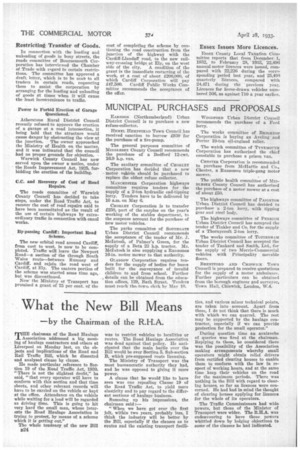What the New Bill Means
Page 42

If you've noticed an error in this article please click here to report it so we can fix it.
—by the Chairman of the R.H.A.
THEchairman of the Road Haulage Association addressed a big meeting of haulage contractors and others at Liverpool on Monday last, on the objects and implications of the Road and Rail Traffic Bill, which he dissected and analysed clause by clause.
He made particular reference to Section 19 of the Road Traffic Act, 1930. "There is not the slightest doubt," he said, "that every operator will have to conform with this section and that time sheets, and other relevant records will have to be carried on the vehicle or kept at the office. Attendance on the vehicle while waiting for a load will be regarded as driving time. This is going to hit very hard the small man, whose interests the Road Haulage Association is trying to protect, by means of a scheme which it is getting out."
The whole tendency of the new Bill was to restrict vehicles to localities or routes. The Road Haulage Association was dead against that policy. He anticipated that the main battle over the Bill would be over Section. 5, Sub-section B, which pre-supposed route licensing.
The Ministry of Transport was the most bureaucratic authority they had, and he was opposed to giving it more power.
A clause that he would like to have seen was one repealing Clause 19 of the Road Traffic Act, to yield more elasticity and to pay regard to the different sections of haulage business.
Summing up his impressions, the chairman said :—
"When we have got over the first jolt, within two years, probably less, I think the industry will be better by the Bill, especially if the clauses as to routes and the existing transport facili
ties, and various minor technical points, are taken into account. Apart from these, I do not think that there is much with which we can quarrel. The rest may be supported by the haulage contractor, especially if we can provide protection for the small operator."
During question time an avalanche of queries was fired at the chairman. Replying to these, he considered there was the possibility of the Association making arrangements whereby small operators might obtain relief drivers front certilie.d clearing houses to enable them to conform with the law in respect of working hours, and at the same time keep their vehicles on the road for the maximum periods. There was nothing in the Bill with regard to clearing houses, so far as licences were concerned. He had had in mind the thought of clearing houses applying for licences for the whole of its operators.
The Traffic Commissioners had wide powers, but those of the Minister of Transport were widen The R.H.A. was endeavouring to have those powers whittled down by lodging objections to some of theclauses he had indicated




































































































